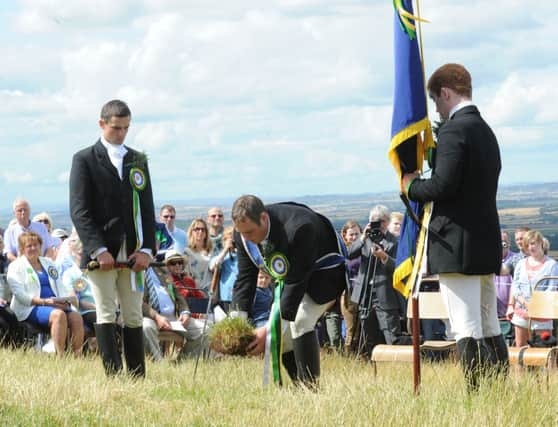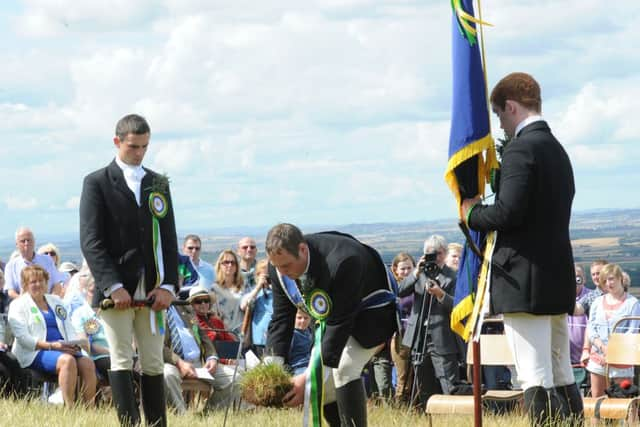WATCH: Battle of Flodden remembered


The day started in the town’s Market Square with the 15th Earl of Home charging Colin to lead the cavalcade. commemorate the dead of both nations and to return from the battlefield with a sod of earth to remember the actions of the Coldstream Priory nuns who carried back the bodies of the dead Scottish noblemen from Flodden to Coldstream to give them a Christian burial in consecrated ground.
Hundreds lined the High Street to see the 62nd cavalcade leave for Flodden where this year’s oration about the battle was given by Ettrick, Roxburgh and Berwickshire MSP John Lamont.
Advertisement
Hide AdAdvertisement
Hide Ad“Few events have shaped Scotland’s national psyche quite like the battle of Flodden,” said Mr Lamont.


“Though we are now almost 501 years removed from that fateful day, memories of what transpired here continue to resonate and for Scots the battle will forever be of the greatest significance.
“It will forever be of such importance because of the values that Flodden encapsulates. Values such as honour - to the King, to the land and to the Auld Alliance. Values such as duty - men, and boys, coming together, rallying to the cause. And values such as bravery – charging down the hill to confront Surrey’s forces.
“Of course, the battle is associated with something else, something far less glorious - that peculiar Scottish trait of somehow snatching defeat from the jaws of victory.
Advertisement
Hide AdAdvertisement
Hide Ad“This, of course, is not the place to unpick James’ decision to vacate the Scottish stronghold atop this very hill, but it is the time to commemorate what that decision led to.
“Not only did the King himself perish, but so too did thirteen earls, fifteen lords, the Campbell and the Maclean chiefs, the French Ambassador, the bishops of Caithness and the Isles, and James’ son, Alexander. Alongside them lay almost 15,000 others: men and boys; husbands and sons.
“It is said that until the brutality of the Somme, no other battle saw so many slain, so quickly as did Flodden. So today is a time for reflection, a moment to remember all those who fell and the nation that mourned them.
“From my home on Coldstream’s High Street, just the other side of the Tweed, I can see quite clearly Flodden hill.
Advertisement
Hide AdAdvertisement
Hide Ad“On that wild September afternoon, it is exactly the same view those remaining towns folk would have had of the battle. And I can only imagine their horror, their panic as the forces began to collide.
“These, needless to say, were the days before social media, before an all seeing eye, revolutionised communication. There was no Sky News helicopter broadcasting the latest developments to the nation.
“There was no Twitter or Facebook. But one can only imagine what the tweets linked to hashtag Flodden would have described, had Twitter existed.
“Those in Coldstream could only watch and wait to find out what had transpired, who had been victorious and who would never return home.
Advertisement
Hide AdAdvertisement
Hide Ad“For those beyond in other countless towns and villages across the Borders, the agonising wait would have been longer still – and, for the vast majority, the news was decidedly grim.
The legion of casualties meant this was truly a national tragedy. And while historians have focused on James’ death - on how Flodden decimated parts of the Scottish nobility - it was the lower orders who suffered most. For while their grief was no stronger, their sense of loss no keener, for these ordinary folk - the men who perished were not just husbands and fathers they were breadwinners, patriarchs and community leaders.
“Literacy, that most basic tool, was restricted to only a chosen few; men – and it was almost exclusively men whose final journey was to follow the King up Flodden hill.
“In their absence it is said that in Selkirk no records were kept, because simply nobody was able to read and write. Births, deaths and marriages went undocumented, and the town council’s minutes weren’t taken.
Advertisement
Hide AdAdvertisement
Hide Ad“So for Scotland, Flodden wasn’t just a personal tragedy, it was a civic catastrophe which permeated through every facet of daily life.
“Today – standing in this field with the sea to the east, the Lammermuirs to the north and the Eildon hills beyond it strikes me that Flodden was, simultaneously, a deeply personal tragedy and a calamity of national proportions.
“Once the fighting had ceased, and silence fallen, the nuns of Coldstream ventured to the battle site and brought back bodies of the dead so that they would receive a Christian burial.
“Led by Isabella Hoppringle, friend of James’ widow Margaret Tudor and reputed English spy, the nuns ensured a proper final resting place in the consecrated grounds of Coldstream Priory.
Advertisement
Hide AdAdvertisement
Hide Ad“In so doing, they epitomised the same honour, duty and bravery of those who had fought and perished at the King’s side.
“Flodden may have been a defeat, it may have been a national catastrophe, but we remember the valour of those on both sides and reflect upon the loss of Scottish – and English – life.
“This shared loss, this shared history is a very real aspect of Flodden.
“Whether bound together or at war, the fates of Scotland and England have always been deeply entwined.
Advertisement
Hide AdAdvertisement
Hide Ad“And though they may not have known it, and while some wouldn’t have felt it, the Scots and English who collided that stormy afternoon, had much in common.
“And so while it is right that as Scots we pause and reflect on our own experience of the battle, let us never forget that grief touched families on both sides of the border.
“This is history’s dark truth; its forgotten legacy.
“For while we chronicle the past through points of rupture – tales of schism, disorder and war – history’s most powerful lesson is that unity always triumphs over division.”
Following the oration Hawick singer Joyce Tinlin gave a haunting rendition of ‘The Wail of Flodden’ before the Coldstreamer cut the symbolic sod of turf from Branxton Hill on Flodden Field to carry it back to Coldstream where it was laid at the site of the old priory on Tweed Green during a solemn and moving ceremony in the early evening sunlight. bringing to a close the formal proceedings of Coldstream’s Civic Week Flodden Day.